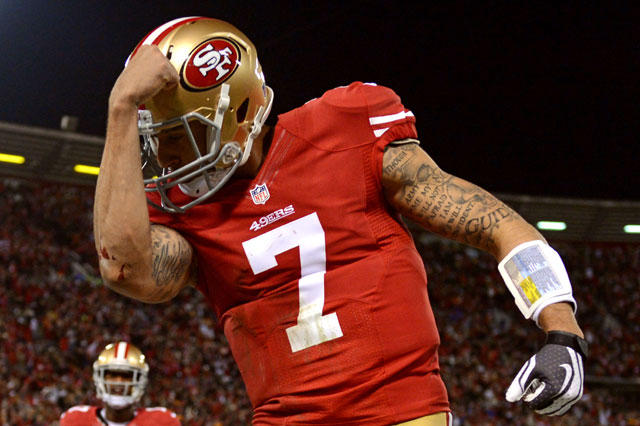It cites Kaepernick, Patton and Lockette as suspects in an incident that unfolded the evening of April 1 and early April 2, in a luxury residential hotel on Miami's Brickell Avenue.
The unnamed woman, who says she has had a previous sexual relationship with Kaepernick, said she went to visit Lockette in his apartment. Patton and Kaepernick were already there when she arrived. The report continues:
"They talked for a while and she mixed some drinks for all of them and gave them shots. advised [sic] that they told her that in order to drink the shots she had to 'hit' the bong which contained marijuana.
"They sat down, talked, and watched the basketball game. She started to feel light headed and went to a bedroom to lie down. [Redacted] took off her jacket and jewelry. Mr. Kaepernick came behind her into the bedroom and started kissing her. She advised they were kissing (mouth) and Mr. Kaepernick started to undressed her [sic]. She got completely naked. Mr. Kaepernick told her that he was going to be right back and left the bedroom. They did not have sex. [Redacted] advised that she was in bed naked and Mr. Patton and Mr. Lockette opened the door and “peeked” inside. She told them 'what are you doing? Where is Colin?;' 'get out!'. They closed the dooer and left. She cannot remember anything after that.
"[Redacted] woke up in a hospital and doesn’t remember how she got there or who transported her to the hospital."
So, to be clear, nothing there reflects glowingly on Kaepernick or the other players. The disturbing suggestion that's raised, and that media outlets have been quick to seize on, is that the woman was drugged, assaulted and then dumped at a hospital.
But that's a suggestion that comes from filling in the blanks: "If A and B happened, then C must have happened, too."
At this point, it's important to note that a presumption of innocence is afforded even to pro football players who may comport themselves in a questionable manner.
In fact, the document we're looking at today is what the police are careful to describe as an "information report." It does describe the woman as a "victim" and the players as "suspects." But as Kelly McBride, a media ethics specialist at Florida's Poynter Institute, notes: “There are gaping holes in the police report. The journalistic response is to describe those holes and ask the police how they’re filling them.”
Among the obvious questions the police document raises, McBride points out, is what the hospital says about the woman's state and condition. How did the woman get to the facility? If she was incapacitated somehow, was a drug test performed? Was a sexual assault suspected?
McBride said that with so many unanswered questions, it's "absolutely disingenuous" for media outlets to characterize the police inquiry as a sexual-assault investigation.
Don Samuel, an Atlanta attorney who has had a hand in defending high-profile sports figures who faced criminal allegations, says, "I'm not sure how anyone could even bring a charge," based on the information the alleged victim supplied police, "because we don't know what happened to her. Did she have a bad reaction to the marijuana? Did she fall down the stairs at her home? Did she have an epileptic seizure? ... What is the crime here?"
In fact, the police document doesn't refer to any charges at all and concludes, "The investigation continues ..."
As it does, maybe those blanks we've been so quick to fill in will be replaced by facts. And then perhaps we'll know what Colin Kaepernick and his buddies were up to that night in Miami.
